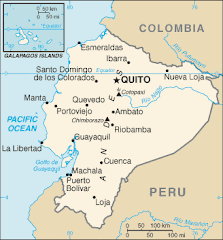


Water, our sustenance. From the mighty power of the ocean, a small trickle of a stream or a glamorous snowflake, it is water in which our life depends. We are at the mercy of water in all of its forms and natural manifestations. We are now reaching a global water crisis which is becoming apparent throughout the world, and more so in nations which do not have the funds to manipulate its nature.
We are now well into rainy the season her in coastal Ecuador. It may not seem so traveling down the dusty dirt roads to arrive to the small town in which I live. One may suspect that we are in the midst of September while covering ones eyes from the dust swirling past. “Never in my life have I seen a rainy season so dry, 15 days with out rain when we are accustomed to long downpours every evening.” Don German Quinonez, cacao farmer and President of UOCAQ cacao cooperative. The changing weather patterns are not only inconvenient given that they have coincided with the Carnival festivities but they are also detrimental to the livelihood of the farmer’s in the community and their precious crop of cacao.
Every year Ecuadorian coastanians celebrate Carnival by marveling in the plentitude of water. People flock to the beach from all over the country, and a pedestrian is never safe from an unexpected water gun or bucket. The holiday is celebrated through water and all its glory. Those in the campo take shelter from the heat in the local river and dance until the morning. Throughout the world water is a spiritual, cleansing element. Many cultures and religions use water as a sacred facet. This seems very fitting considering water makes up three fourths of the world as well as our bodies. Without water we have no life and we spread the importance of this natural gift into our religious teachings and cultural traditions. “We worship the sources of mighty rives; we erect altars at places where great streams burst suddenly from hidden sources; we adore springs…and consecrate certain pools.” Seneca The Younger, 4 B.C.-A.D. 65.
During this last week my necessity of water became ever so clear as no water came from the stream which is its source, my beautiful cherry tomatoes began to dry and sag, and I realized I had been taking for granted this wonderful resource from God.
While living between two large rivers as well as flowing streams it is not so obvious that there is a global shortage of water. It can be easy to take this abundance of water for granted, but when I realize even we are facing this problem, I can only imagine how the lack of water devastates other regions a million times amplified.
Not only are we facing a water shortage, but a lack of clean water. Water is being poisoned by humans all over the world on a small and grand scale. We are causing massive oil spills, leaking chemicals into our water sources as well as throwing trash and human wastes into lakes, streams and rivers. Water is a global resource and positive change must be worldwide to thrive. We can not put up boundaries between nation’s water sources so that contaminates from one land do not reach another. To improve water quality, we all must be in this together.
While teaching students in Ecuador the water cycle we mapped the path of one contaminated drop of water starting from our small classroom. We saw that this path would flow into the stream behind our class, then into a larger river, to eventually reach a larger river, Rio Esmeraldas, and finally make it to the grand Pacific Ocean. This activity illustrated the interconnectivity of the land and the impact each community and individual makes on a global scale. Though it may be hard for my students to understand the expansiveness of the world, we are all connected in the fight for clean water.
It may seem evident that only in a matter of time we will reach a tipping point in which the fight for water will prevail in the struggle for human existence.

No comments:
Post a Comment